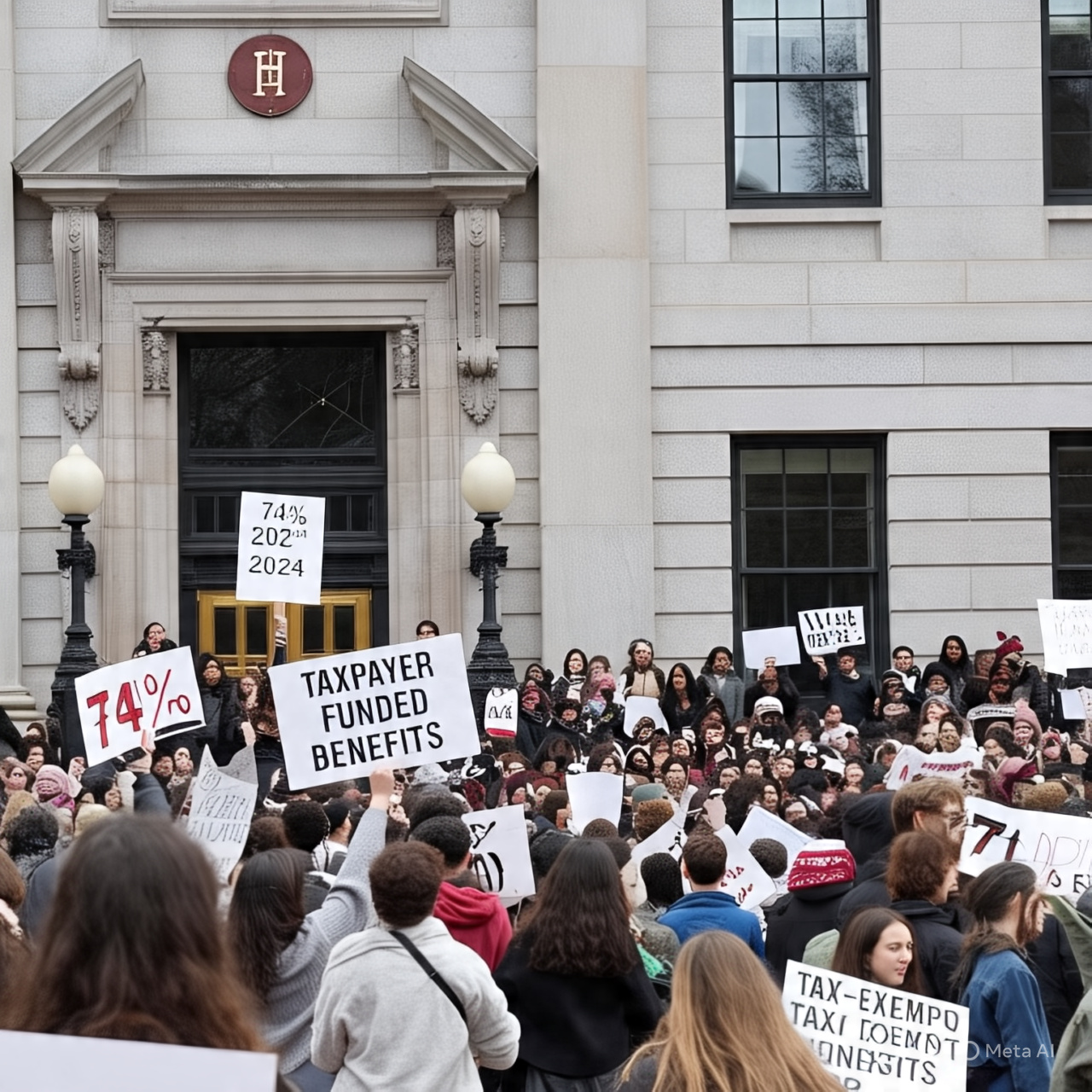FnF News
Critics Slam Harvard for Relying on Taxpayer Subsidies Amid Billions in Endowment Wealth
By Khadija Khan | FNF News | May 29, 2025
CAMBRIDGE, MASS. — A new wave of scrutiny is hitting Harvard University as critics highlight the Ivy League school’s deep reliance on taxpayer subsidies, despite holding the largest university endowment in the world.
According to recent financial data and tax policy research, an estimated 74% of Harvard’s effective revenue in 2024 came from tax-exempt privileges, federal funding, and other public subsidies, raising urgent questions about equity, transparency, and the proper role of elite institutions in American society.
“It’s time we stop pretending these universities are private,” said Sen. Josh Hawley (R-MO). “They are publicly subsidized political machines, and we need real reform.”
Where the Money Comes From
Harvard’s total revenues for 2024 exceeded $6.2 billion, according to the university’s financial report released earlier this year. But an increasingly large portion of this revenue is shielded from taxation or directly sourced from federal programs:
- Tax-exempt status: As a nonprofit, Harvard does not pay federal income tax on its investment earnings, which totaled over $2.5 billion last year.
- Endowment earnings: Harvard’s endowment hit $53.2 billion in 2024, and most investment returns are shielded from taxation thanks to its 501(c)(3) status.
- Federal research funding: Harvard received $680 million in federal research grants in 2024, much of it from the National Institutes of Health (NIH) and Department of Defense.
- Tax-exempt property: Harvard owns approximately 5,000 acres of land and real estate, largely untaxed due to its nonprofit classification, costing local governments millions in lost revenue annually.
“When you factor in the federal support, tax breaks, and subsidies, a vast portion of Harvard’s operation is essentially underwritten by the public,” said Richard Vedder, an economist at the Independent Institute and author of Restoring the Promise: Higher Education in America.
Backlash Grows in Washington
Lawmakers from both parties are beginning to question why wealthy private institutions like Harvard should continue to benefit from such sweeping financial protections.
In April 2025, a bipartisan group led by Senators Tom Cotton (R-AR) and Sheldon Whitehouse (D-RI) introduced the Endowment Accountability Act, which would:
- Impose a minimum federal excise tax on annual endowment gains over $10 billion
- Require universities to disclose detailed endowment spending reports
- Tie federal research funding to demonstrated public service outcomes
“Taxpayers shouldn’t be funding ideological luxury institutions while struggling to pay for community colleges,” said Sen. Cotton in a Senate floor speech.
Harvard Defends Its Record
In response to the growing criticism, Harvard officials argue that its tax-exempt status supports its core mission of education and research, and that its endowment benefits the public.
“Harvard’s endowment is not a pile of cash — it is a permanent source of funding for scholarships, faculty research, and public service,” said Harvard President Claudine Gay in a statement before her resignation in January 2024. “Every dollar earned supports students and global innovation.”
Harvard noted that more than 60% of undergraduates receive need-based aid, and that the university’s research advances medicine, public health, and science that benefits the world.
Still, critics say such justifications fall short when the university continues to collect tuition upwards of $55,000 per year, excludes many working-class students, and pays some administrators over $1 million annually.
A Broader Trend of Elite Shielding
Harvard is not alone. A 2024 report from the Congressional Budget Office (CBO) found that America’s top 20 private universities collectively receive over $20 billion annually in public subsidies, tax breaks, and direct funding — even as their endowments balloon.
“The higher education tax structure is rigged for the rich,” said Naomi Schaefer Riley, a fellow at the American Enterprise Institute. “Elite universities operate more like hedge funds with dormitories than public-serving institutions.”
Public frustration with higher education costs, combined with elite schools’ perceived political activism, has fueled calls for audits, accountability, and potential revocation of tax-exempt status for the wealthiest schools.
Reform or Reckoning?
A March 2025 Pew Research Center poll found that:
- 68% of Americans believe elite universities benefit the wealthy more than the public.
- 72% support increased taxation on endowment profits over $10 billion.
- 59% support stripping tax-exempt status from universities that restrict viewpoint diversity.
“It’s not just about money — it’s about legitimacy,” said Ilya Shapiro, legal scholar at the Manhattan Institute. “When universities are publicly funded but politically one-sided, it becomes a constitutional and cultural concern.”
Conclusion
As public trust in elite institutions continues to decline, Harvard’s heavy dependence on tax-exempt and publicly funded revenue streams is emerging as a symbol of deeper concerns in the American education system.
For lawmakers pushing for reform, the numbers tell a story of inequality masked as charity — and they’re demanding a new deal for higher education.
Sources:
- Harvard University Financial Report, Fiscal Year 2024
- Congressional Budget Office Report on Higher Education Subsidies, 2024
- U.S. Department of Education Federal Funding Allocations, 2024
- Pew Research Center, Higher Education Survey, March 2025
- “Endowment Accountability Act” Senate Bill S.4123, 2025
- American Enterprise Institute commentary, April 2025
- Interview with Richard Vedder, Independent Institute, May 2025

